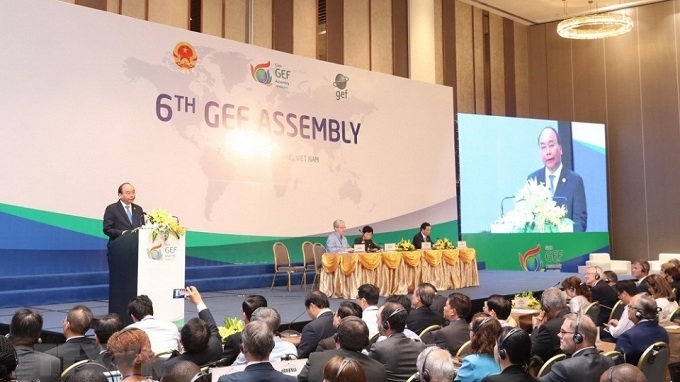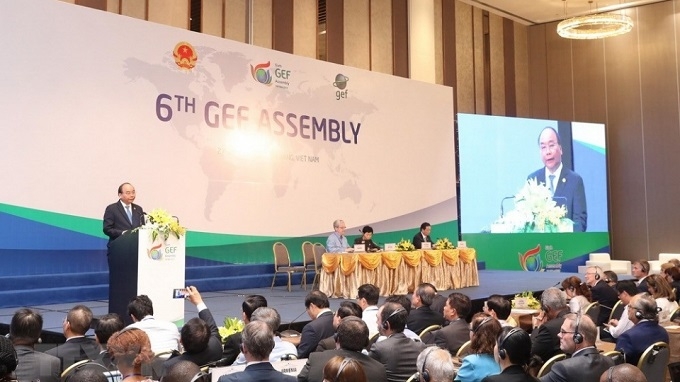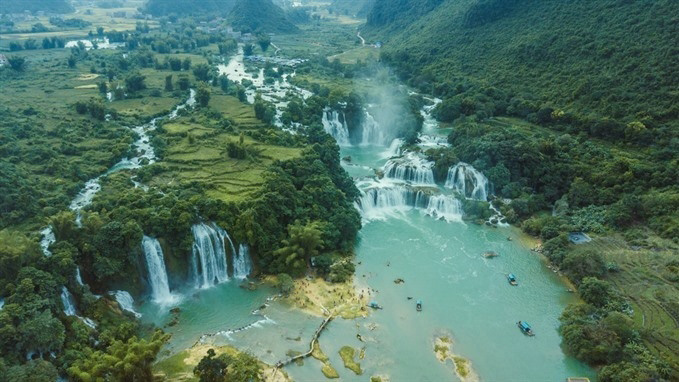



Prime Minister Nguyen Xuan Phuc addresses the opening session of the
sixth Global Environment Fund Assembly in Da Nang city on June 27, 2018.
1. The eighth session of the 12thParty Central Committee (PCC) issued Resolution No. 36-NQ/TW dated October 22, 2018, on the Vietnam marine economic development strategy by 2030, with a vision to 2045. This is an important and urgent resolution of the Party, as the domestic and international situations concerning the sea and islands are proceeding in a complicated manner, requiring the building of Vietnam into a powerful marine nation with sustainable, prosperous, secure and safe development; proactive and responsible engagement in resolving regional and international issues concerning the sea and ocean; and the sea-based economy contributing significantly to the national economy. Sustainably developing the marine economy on the foundation of green growth is the spirit throughout the resolution. The resolution sets out five major guidelines on marine and coastal economic development, three breakthrough stages, and seven priority groups of measures.
2. The 14thNational Assembly (NA) passed the Law on Measurement and Maps. This is the first time that the specialised activities in Vietnam’s measurement and map area has been standardised into a law, which holds an extremely significant meaning in the period of Industry 4.0. The law will function as the base to develop national geospatial data infrastructure and research Earth science; provide basic survey data in service of socio-economic development, national defence and security; serve planning, territorial management, and the supervision of natural resources and the environment; serve disaster prevention and control; and contribute to safeguarding and affirming national sovereignty and improving the people’s intellectual levels.
3. Many guidelines of the Party on land resource management, environmental protection and climate change response were summarised and reviewed comprehensively, typically the preliminary review of the 11thPCC’s Resolution No. 19-NQ/TW dated October 31, 2012, on continuing to renovate the policies and laws on land in the period of comprehensively accelerating the renewal process; and the Resolution No. 24-NQ/TW on proactively responding to climate change and strengthening natural resource management and environmental protection. Thereby, the obtained results as well as the shortcomings were pointed out, requiring more drastic directions in perfecting the policies and laws and organising enforcement in order to promote natural resources, protect the environment, and respond to climate change in service of the sustainable development of the country in the coming period.
4. The Prime Minister issued Directive No. 27/CT-TTg on September 17, 2018, concerning several urgent measures to strengthen management over the imports and use of imported scrap as materials for production. The directive requested the Ministry of Natural Resources and Environment (MONRE) to comprehensively inspect the granting of certificates in importing scrap, not to grant new or renew the scrap import authorisation certificates, and only grant new or re-issue certificates of environmental protection eligibility when businesses can prove their demand and capabilities to use scrap as production materials export. The ministry was also urged to design measures to handle the scrap batches in stock at seaports in line with the law on environmental protection. Also in 2018, the MONRE promulgated circulars on national technical standards concerning the environment for six types of imported scrap which are currently in great demand, including iron and steel; plastics; paper; glass; non-ferrous metal; and blast furnace slag.
5. Vietnam hosted the sixth Global Environment Fund (GEF) Assembly, which discussed the world’s environmental issues with the participation of nearly 1,500 delegates, including heads of state, government leaders, ministers, and environmental officials from 183 nations, alongside the United Nations bodies, non-governmental organisations on the environment, international financial institutions, representatives from various development partners in Vietnam, and environmental experts. At the opening session, Prime Minister Nguyen Xuan Phuc delivered a message calling for joint efforts to realise the hopes of a "highly resilient, sustainable and vital planet”. In addition, Vietnam successfully organised many important international conferences on the environment in the last year, thereby affirming the country’s role, position and contributions to dealing with global issues and challenges on resource management, environmental protection, climate change response, and sustainable development.
6. An initiative to establish a global cooperation mechanism for reducing plastic garbage towards clean and green oceans free of plastic waste was proposed by the Vietnamese Prime Minister at the G7 Outreach Summit in Canada and the sixth Global Environment Fund (GEF) Assembly, winning high appreciation from the international community. In order to implement the initiative, the Ministry of Natural Resources and Environment launched a movement of combating plastic waste and gradually reducing the use of single-use plastic products in 2018, which has been actively responded to by many agencies, organisations and communities. The ministry has also developed a national action plan to manage plastic waste in the oceans.
7. The Non Nuoc Cao Bang Geopark in the northern border province of Cao Bang was recognised as a global geopark during the 204thsession of the UNESCO Executive Board in Paris, France, on April 12, 2018. This is Vietnam’s second UNESCO-recognised global geopark, after the Dong Van Stone Plateau in the northern province of Ha Giang, the country’s 38thUNESCO title, and the eighth global geopark in Southeast Asia. Non Nuoc Cao Bang covers nearly 3,300 square kilometres in nine districts. It is home to fossils, ocean sediment, volcanic rocks, minerals, and especially karst landscapes, which can give researchers an insight into an over-500-million-year history of the Earth. The geopark is also well known for rich biodiversity and many indigenous fauna and flora species.

Ban Gioc waterfalls in Trung Khanh commune, Cao Bang province is one of the most beautiful waterfalls in Vietnam. The waterfalls are located within the Non Nuoc Cao Bang Geopark, which has been recognised as a global geopark by the UNESCO. (Photo: VNA)
8. Hanoi became the first city of Vietnam to have a synchronous and modern air monitoring system according to the national environment monitoring system. Accordingly, the monitoring data on air quality is updated relentlessly round the clock and widely publicised on different means of media so that the people can access and be aware of the air environment quality in their living areas.
9. Efforts were strengthened in accelerating the implementation of the e-Government, the application of information technology, administrative reforms, and the reduction of business conditions and the list of goods subject to specialised inspection in the natural resource and environment areas. In 2018, an interconnected system between the MONRE and 63 provincial Departments of Natural Resources and Environment, provincial-level People’s Committee and government agencies, was successfully applied, allowing the direct delivery and reception of documents. The environmental area saw the reduction of 102 of 163 business conditions and 38 of 74 goods subject to specialised inspection.